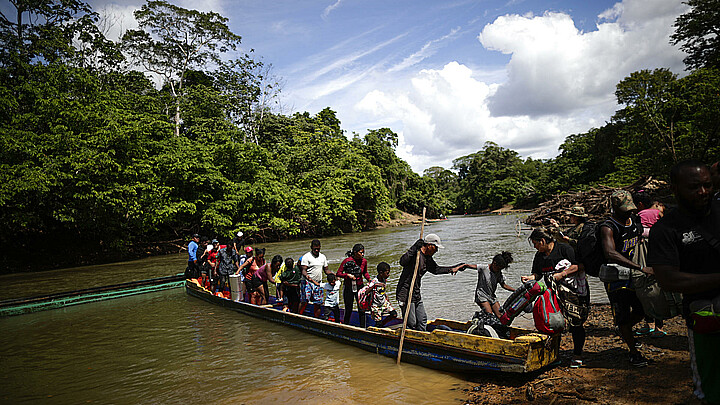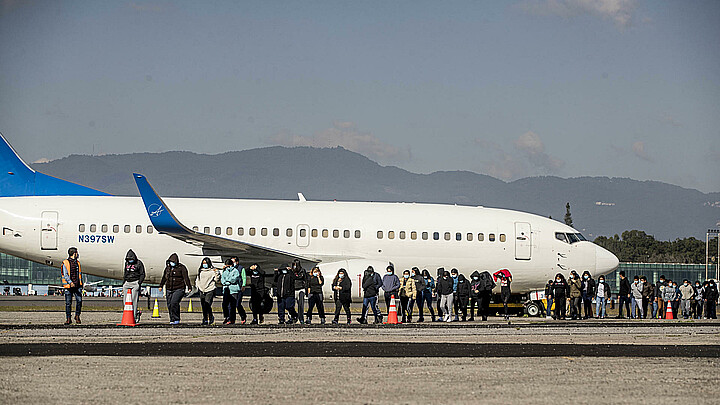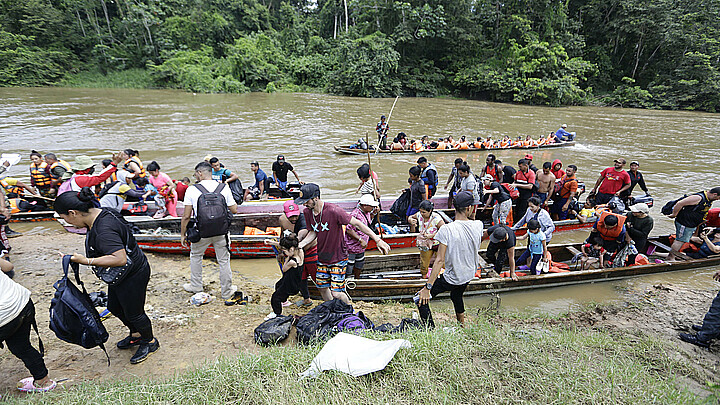Immigration
Panama closes Darién Gap jungle trails to protect migrants from dangerous crossings and violent crime
The Panamanian government announced that “between four and five crossings were closed” in the Darién Gap as a measure to redirect and “take care” of migrants

July 11, 2024 10:26am
Updated: July 12, 2024 7:30am
The Panamanian Government announced this Wednesday that “between four and five crossings” were being closed in Darién Gap, the natural land bridge border between Colombia and Panama as part of an effort to redirect migratory flow through “a humanitarian crossing” to “protect” the migrants crossing the jungle.
The move is just the latest of several the Panamanian government has placed into effect since it began aiming to find ways to close the jungle land bridge as a conduit from South America into Central America and their country.
A September 2023 story published by ADN America first reported the new immigration strategy after Panamanian officials announced they were at a breaking point with 350,000 migrants having crossed the Gap in that nine month period last year.
The “closure of crossings in Darién seeks to protect the safety of migrants,” said Minister of Public Security Frank Ábrego, in a statement.
The minister added that, “between four and five crossings were closed through which illegal migrants entered Panama, driven by 'coyotes' from Colombia.”
Last week the Panamanian National Border Service (SENAFRONT) announced the closure of three crossings.
The measure seeks to help SENAFRONT patrols so they “maintain security and effectively combat people (who) try to commit crimes against migrants,” he said.
On May 20, ADN America reported that UNICEF was reporting there were also a wave of unaccompanied child migrants crossing the dangerous jungle land bridge.
“What we have tried to establish … to respect human rights and guarantee their lives, was the creation of a humanitarian crossing, which begins in Cañas Blancas, continues along the Tuquesa River, passes through Bajo Chiquito and reaches Lajas Blancas, where they are cared for by organizations such as the International Red Cross, the National Red Cross, UNICEF, UNHCR and others,” he explained.
Ábrego also indicated that “more than closing the border, the purpose is to reduce the number of migrants who irregularly cross the Darién jungle,” and that before the new presidential administration, there used to be around 1,000 a day.
The new Panamanian president, José Raúl Mulino, who won largely on an immigration control platform, began serving July 1.
According to the Ábrego, "the most recent report reveals that, although the flow of migrants continues, the measures implemented are achieving effective control," although it did not provide specific figures.
Ábrego also said that “many” of the migrants who cross the jungle do not carry identity documents, so they had to resort to alternative methods such as giving their fingerprints.
He said “it was possible to detect up to three thousand people linked to different crimes” and that 18 were “related to terrorist activities and were not detected by the Colombian authorities while passing through that country.”
The minister also said, “that the Colombian Government has been notified about the implementation of a safe route for the passage of migrants with the aim of protecting them from any type of aggression,” and clarified that “there is no immigration post joint between Panama and Colombia.”
“Consequently, to close the migrant crossings, we do not have to consult the neighboring country,” he said.
Following the recent agreement reached with the United States to support “the air transportation of foreigners,” the authority revealed that “the repatriation of illegal migrants will be coordinated with neighboring countries.”
On Tuesday, Colombian President Gustavo Petro questioned Panama's decision to close at least three of the trails used by migrants to cross the Darién Gap, which mark the border between both countries, saying the move would only lead to drownings in the nearby coastal areas, suggesting the migrant may try to swim around them.
"Barbed wires in the jungle will only bring drowned people into the sea," Petro argued when responding to a message from former Colombian President Ernesto Samper, who informed him that the Panamanian government accepted the U.S. policy of blocking migrants in the southern borders so “they do not reach the northern border of Mexico and the United States.”
The closure of these unauthorized trails occurs in the midst of a large flow of migrants through the Darién jungle, through which more than 195,000 people have crossed this year while in 2023 there were more than 520,000—an unprecedented figure, according to official data from Panama.
Most of the jungle crossers are Venezuelans who are seeking to escape the continuing economic and political turmoil unfolding under Nicolas Maduro’s Chavista regime.
ADN America contributed to this report.










